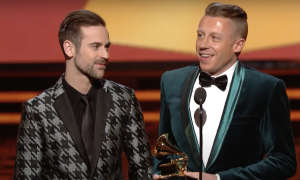Ten years ago, at the 56th Annual Grammy Awards on Jan. 26, 2014, Macklemore made history when he, his musical partner Ryan Lewis, “She Keeps Me Warm” singer-songwriter Mary Lambert, and special guest Madonna performed the gay rights anthem “Same Love,” mashed up with Madonna’s “Open Your Heart,” while Queen Latifah officiated a mass onstage wedding for 33 gay and heterosexual couples. (“I was really proud of that. That was really important,” Grammy producer Ken Ehrlich told me in 2017.)
Macklemore and Lewis also won four Grammys that evening, including Best New Artist (beating out Kendrick Lamar, Ed Sheeran, Kacey Musgraves, and James Blake) and — more controversially — Best Rap Album. It should have been one of the biggest and best moments of Macklemore’s career. But the backlash was vicious and immediate.
Amid social media protest that Lamar’s critically heralded good kid, m.A.A.d city should have won Best Rap Album over Macklemore & Ryan Lewis’s quintuple-platinum The Heist, Macklemore attempted to silence the haters — or, so it seemed, perhaps silence his own inner voices of self-doubt and impostor syndrome — by posting a screenshot of private text he’d sent to Lamar on Grammy night agreeing that Lamar had been “robbed.” The move, however sincere or well-intentioned, backfired badly.
However, in 2022, while speaking with me about his work with CLEAN Cause, a yerba maté beverage company that supports individuals in addiction recovery, the alternative rapper and mental health advocate confessed that he barely even remembered the 2014 Grammys. The entire event was a “bit of a blur,” coming off a year-and-a-half whirlwind when The Heist took off on the strength of other hit singles like “Thrift Shop” and “Can’t Hold Us” — a time when Macklemore relapsed and then struggled to get back on track.
“Going into the Grammys, I wasn’t connected to it. I was in a place of fear, and I think that was a big part of why I responded to winning the Grammys in the way that I did,” Macklemore explained. “I got clean in ’08, and The Heist came out in 2012. I had a one-night relapse in those three and a half years of recovery, but I was prioritizing [my sobriety]. And then, The Heist came out. My world got really fast, really quickly. I stopped going to meetings. I stopped doing the steps. I stopped talking to a sponsor. I don’t even know if I had a sponsor at the time. All of these boxes you have to check to make sure that you stay clean, I wasn’t checking. And I lost it. It was a very weird time period. I look back on it, and there’s moments there when I’m just like, ‘I wish I would’ve been present for that. I wish that I wasn’t trying to escape during that time.’ Like, literally that [Grammy] night, I wanted to escape. I didn’t want to feel.
“That was a challenging time,” Macklemore, whose real name is Ben Haggerty, continued. “I remember right before the Grammys, I got clean and I detoxed, and I had maybe three days clean before the Grammys. Maybe it was a little more than that, maybe it was like five days, but it was fresh. I wasn’t, like, dopesick going into the Grammys, but I had been escaping, and there was so much fear when using, because I’m not connected to my higher power. There’s no faith. When I start using drugs, I lose my faith and fear takes over. And that was the place that I had been in. … And then after that [Grammy backlash] happened, I went right back to using drugs.”
However, Macklemore clarified that he never felt guilty for winning so many Grammys in 2014, nor did he ever feel like he didn’t deserve the honors — despite the apologetic and somewhat cringey message he sent to Lamar that night.
“I’ve never felt imposter syndrome,” the rapper insisted. “I know I make really good music that resonates with people, and I know why it resonates with people. And I won four Grammys! … I think at the time, yes, I thought Kendrick should have won Best Rap Album. But I wasn’t apologizing for the other three that I won; I think that they’re well-deserved. That was a fear-based decision because of where I had been, in terms of how I handled it. But I don’t feel an imposter syndrome at all. I’ve worked my whole life on my craft, and there’s a reason why those Grammys are on my shelf. There’s a reason why I’ve been able to resonate with human beings around the world and have a career. It’s because I’ve put in the sweat equity into something that I’ve been passionate about since I was 7 years old. I just think that there was so much drama and built-up tension, and me coming off of a relapse, that I didn’t know how to handle it at the time.”
Macklemore eventually re-entered treatment and got clean again, and now when he reflects on that Grammy whirlwind, he realizes it “catapulted me back into the rooms of recovery. So, I see the silver lining of that moment in time. I was able to hit that rock-bottom place and really tap back into gratitude, to faith, and to connecting to a power much greater than myself. And the freedom that comes from that is like no other.”
Macklemore maintained a steady and solid career, solo and with Lewis, after the Grammy telecast that simultaneously marked one of the highest and lowest points of his life. He never did replicate the surprise success of the independently self-produced, self-recorded, and self-released The Heist, but he apparently views that development as a great blessing as well.
“I’m really grateful for the place that I ended up in. I don’t ever want to be that level of famous again,” Macklemore stressed. “For me, being at that level of fame where everything that I did became a TMZ story, where every time I landed at the airport there was a group of people wanting me to sign things for eBay, where thinkpieces were being written about me… it was insane. It’s just not healthy for me. It takes that thick skin to just keep creating art, and that’s the place that I got to. There was absolutely a moment there where I’m like, ‘I don’t know if this is worth it,’ but I got back to a place of like, ‘Dude, I’m going to continue to rap. I’m going to continue to make music.’ The album after The Heist was a challenging one to get started on, but once we started on it, it was beautiful, even if it wasn’t received the same in terms of numbers and sales and all that and wasn’t nearly as big as The Heist. I came out the next year with [the solo album] Gemini, which did do well commercially, but it still wasn’t the same level of fame. And you know what? That was perfect. It was perfect.”
Macklemore even chucklingly recalled to me the time he curiously Googled his name right after he and Lewis’s much-anticipated, supposedly make-or-break The Heist follow-up came out in 2016. The query not only revealed that the industry’s first-week sales projections for that album, This Unruly Mess I’ve Made, were an underwhelming 50,000 units, but pulled up a record review in USA Today that “had given the album like half a star out of five, or no star, something just like impossible!” Instead of panicking, Macklemore felt a sense of calm and relief.
“It was that moment when I felt the most free. I was like, ‘It’s over!’” he laughed. “That was a moment of freedom for me creatively, where I was reminded that at the end of the day, the critics actually don’t matter. I stopped Googling my name after that, and guess what happened? I got happier! I’m not thinking about USA Today. Like, who reads USA Today? Like, no one is going to usatoday.com to figure out what whoever wrote that article thinks about an album. And that’s a beautiful thing. It allowed me to get free.
“Now I’m just under the radar, but I’m able to do what I love and still get in front of arenas around the world filled with people that can sing these songs with me. And that’s what it’s all about.”








